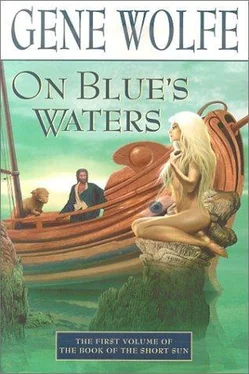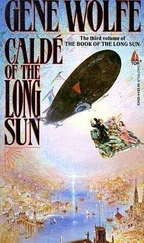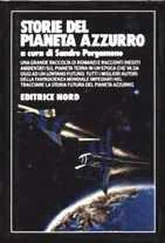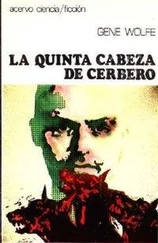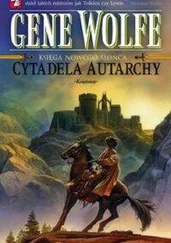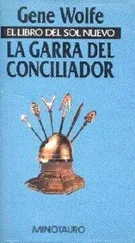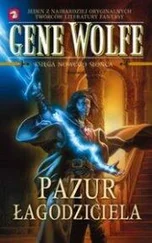Gene Wolfe - On Blue's waters
Здесь есть возможность читать онлайн «Gene Wolfe - On Blue's waters» весь текст электронной книги совершенно бесплатно (целиком полную версию без сокращений). В некоторых случаях можно слушать аудио, скачать через торрент в формате fb2 и присутствует краткое содержание. Год выпуска: 2000, ISBN: 2000, Издательство: Macmillan, Жанр: Фантастика и фэнтези, на английском языке. Описание произведения, (предисловие) а так же отзывы посетителей доступны на портале библиотеки ЛибКат.
- Название:On Blue's waters
- Автор:
- Издательство:Macmillan
- Жанр:
- Год:2000
- ISBN:9780312872571
- Рейтинг книги:4 / 5. Голосов: 1
-
Избранное:Добавить в избранное
- Отзывы:
-
Ваша оценка:
- 80
- 1
- 2
- 3
- 4
- 5
On Blue's waters: краткое содержание, описание и аннотация
Предлагаем к чтению аннотацию, описание, краткое содержание или предисловие (зависит от того, что написал сам автор книги «On Blue's waters»). Если вы не нашли необходимую информацию о книге — напишите в комментариях, мы постараемся отыскать её.
On Blue's waters — читать онлайн бесплатно полную книгу (весь текст) целиком
Ниже представлен текст книги, разбитый по страницам. Система сохранения места последней прочитанной страницы, позволяет с удобством читать онлайн бесплатно книгу «On Blue's waters», без необходимости каждый раз заново искать на чём Вы остановились. Поставьте закладку, и сможете в любой момент перейти на страницу, на которой закончили чтение.
Интервал:
Закладка:
I had been tempted to leave it at home. Not because I did not love it-I did, and almost certainly loved it too much; no man is so secure in his sanity that he can afford to lavish on a mere inanimate object the passionate affection that every good man at some time feels for another person. Loving it as I did, I had known I was carrying it into deadly danger when I resolved to take it to the Long Sun Whorl and present it to Silk. So it proved; I nearly lost it at once, and it did not remain with me long. I can only say that I knew the risk from the beginning, resolved with open eyes to run it, and am very glad I did.
So it has proved, and where is the Nettle who shall produce copy after copy of this, of this record of my travels and dangers and lucky escapes that I have begun, this Book of Horn ? But you must surely think that in all this I have left my earlier self and our motionless sloop far behind.
I have not, because it was then, reading in the sloop by the light of the declining sun, that the thought of printing struck me with full force. I had read (I believe) that Silk had come upon a stone carved with a picture of Scylla, and I moved by imperceptible mental stages from the carving of that stone to the cutting into fine stone of pictures for books, as artists sometimes did at home, and from there to cutting whole pages as the pictures are cut, pages that might then be duplicated again and again, and from that to the memory of a visit to a printing shop with my father, who had supplied its owners with certain papers and inks, not all of which had proved completely satisfactory.
I ought to say here that Nettle and I had discussed the possibility of printing long before I wrote the incident in which Silk stopped to pray before the Scylla-marked stone. We had discussed it, but both of us had quickly concluded that it would be far easier to create the two or three copies we then envisioned by hand than to build the equipment necessary to print them and learn the process. Having thus sensibly concluded that printing was beyond our grasp, we abandoned all thought of it.
Now I, having seen the eagerness with which Nettle’s copies were bought, thought of printing again-but in a whole new light: I knew beyond doubt that we could sell as many as twenty or thirty in the course of a year, if only we had them.
Furthermore, we might also print the much shorter account of our departure from Old Viron that Scleroderma had completed before death claimed her. A grandson had her manuscript, and allowed others to copy it. Surely he would allow Nettle to copy it as well, and from her copy we might print and sell a dozen at least. In addition, there was a man in Urbasecundus who was said to have produced a similar book, although I had never seen it. We had paper, and the modest skills and tools required to sew folded sheets into a book and to bind the book between thin slats of runnerwood. We needed nothing but printing to create a new and profitable use for the paper we made and sold already.
Nor was that all. Printing tens of thousands of words would surely require hundreds of reusable letters, and perhaps a thousand or more. In the shop I had visited with my father, they had made their letters by pouring molten metal into metal molds. (This reminded me of Chenille’s description of the way in which the heads of taluses are made, and I found and reread it.) The metal, which I recalled seeing a woman heat in an iron ladle held in a charcoal fire, had appeared to be pure silver when it was poured; but my father had said that it was mostly lead.
That in turn reminded me of a conversation a week earlier with Sinew, who delighted in discussing weapons of every kind and was prone to pontificate about them. I had urged that needlers were better suited to conditions here than slug guns, if only because the projectile fired was a simple, slender cylinder, not gready different from a short piece of wire. We owned a slug gun as well, the one with which Nettle had fired on the pirates, and although the gun itself was considerably simpler than a needier, every shot required a separate casing and a multitude of other parts that could be used only once: a dot of special chemical in a tiny copper cup, an explosive to propel the slug, the slug itself, and a disk of stiff paper, heavily waxed, with which to seal the casing-this last (I said) being the only item on the entire list that we ourselves could supply.
Sinew had disagreed. “Some man in town gave Gadwall a couple of needles and told him to make him some iron ones. He did, too. He cut them out of a thin rod he had and rolled them between red-hot plates and polished them. He showed them to me, and the real needles. His looked like the real thing. I couldn’t tell them apart. But when you put them in a needier, they wouldn’t shoot. Gadwall said you could have dropped in that many straws and done every bit as well.”
I started to object, but Sinew interrupted.
“Slug guns are different. We’re already making slug guns that work. In that book you and Mother wrote, you have one of the soldiers tell somebody his slugs are made of some stuff I never heard of.”
I agreed. “Yes, depleted uranium. That was what Silk said he said.”
“Well, I don’t know what that is. But I know the slugs they make in town are lead. You know about the silver mine they found up in the mountains?”
“I know everybody’s talking about one. I haven’t been there, but it sounds very promising.”
“Yeah.” He was silent for a moment, and I could see the dream of finding such a mine himself in his eyes. “We need a lot of things, and we’ve got to have things to trade for them, stuff that doesn’t take up a lot of room on the boat and won’t spoil. Silver should be perfect. The miners already swap it for whatever they need, like mining tools and powder, and the goldsmiths are making it into rings and stuff so it will bring more. Or you can just swap a little silver bar for twenty times that much iron. It’s better than the paper, all the traders want it.”
“Are you saying that silver can be used in the slug gun cartridges in place of depleted uranium? Or that iron can? Iron would be cheaper, naturally.”
He had shaken his head. “There’s lead in the silver ore. It’s heavier than silver, so the two are pretty easy to separate. So we’ve not only got silver here we’ve got lead, too, and that works great. You can’t trade it, not now anyway, because it’s heavy and nobody wants it much. But it’s a metal you can feed to slug guns, and we’ve got it.”
Lead could be cast into type, even cut into type by hand if the casting proved difficult, and lead was available and cheap. We would not need to start with thousands of movable pieces and print a book. Most people who wanted our paper wanted it for writing letters. We could-we would!-offer them decorated papers. Marrow could have a picture of a vegetable marrow on his paper if he liked, in green or yellow ink. Men named for birds, as Auk had been and Gyrfalcon and Gadwall were, could have a picture of the appropriate bird. Nettle drew very skillfully and had taught Hoof and Hide to draw almost as well as she did. Most women were named for flowers, and flowers were easy to draw (Nettle sometimes sketched them for amusement) and should be easy to print.
I was so excited by the prospect that I would have paced up and down if the size of the sloop had permitted it. As it was, I climbed out on the bowsprit and waved my cap to the empty, rolling sea and the dim and distant land. If the trolling bird was impressed, he showed no signs of it.
Returning to our book (in which I had lost my place) I read as before, often carried away by thoughts of printing and the wonderful possibilities it offered, until I chanced on a passage that caught me up short, the one in which Silk brings the Peace of Pas to the talus he has killed in the tunnels. Many prayers and blessings were already falling into disuse; but Nettle had told me of a woman she knew who had written dozens on sheets of our paper and hung them on the walls in her house to preserve them. Others might do the same, and no doubt some already had; but by printing, such things could not only be saved but disseminated.
Читать дальшеИнтервал:
Закладка:
Похожие книги на «On Blue's waters»
Представляем Вашему вниманию похожие книги на «On Blue's waters» списком для выбора. Мы отобрали схожую по названию и смыслу литературу в надежде предоставить читателям больше вариантов отыскать новые, интересные, ещё непрочитанные произведения.
Обсуждение, отзывы о книге «On Blue's waters» и просто собственные мнения читателей. Оставьте ваши комментарии, напишите, что Вы думаете о произведении, его смысле или главных героях. Укажите что конкретно понравилось, а что нет, и почему Вы так считаете.
